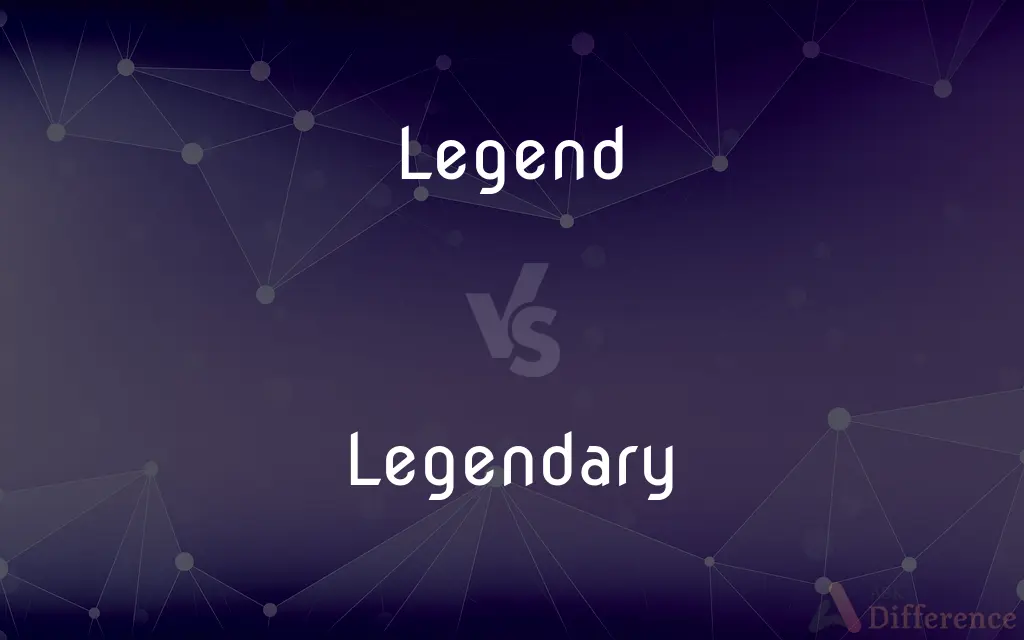Legend vs. Legendary — What's the Difference?
Edited by Tayyaba Rehman — By Fiza Rafique — Updated on April 4, 2024
Legend is a narrative of historical events or folklore, often mythic, while legendary describes something or someone so famous as to be considered mythical.

Difference Between Legend and Legendary
Table of Contents
ADVERTISEMENT
Key Differences
Legends are traditional stories passed down through generations, often without a verifiable basis in fact. These narratives frequently blend historical events with mythical elements, creating a tapestry that reflects the values and fears of a culture. On the other hand, the term "legendary" is an adjective that describes anything or anyone that has achieved legendary status, often because of extraordinary achievements or characteristics that elevate them to a near-mythical standing in public perception.
While legends often serve to explain historical events, cultural practices, or natural phenomena in a narrative form, legendary is used to highlight the exceptional nature of individuals, objects, or events. For example, a warrior from ancient times might become the subject of a legend, while a particularly skilled athlete in the modern era might be described as legendary for their unparalleled achievements.
Legends can be specific to a region, culture, or community, reflecting localized values, fears, and aspirations. They are part of the collective memory and identity of a group. In contrast, something or someone described as legendary often transcends local boundaries to gain wider recognition, sometimes globally, due to their extraordinary nature or achievements.
The creation of a legend is a gradual process, often occurring over many generations, as stories are told and retold, sometimes changing in the process. Legendary status, however, can be attained relatively quickly in comparison, especially with the advent of modern media, which can amplify an individual’s or object’s reputation to legendary proportions almost overnight.
Legends often incorporate supernatural elements or fantastical creatures, serving not only to entertain but also to convey moral lessons or explain mysteries. Legendary, meanwhile, may not necessarily involve the supernatural but rather emphasizes the exceptional quality or nature of someone or something that seems almost beyond human capability or understanding.
ADVERTISEMENT
Comparison Chart
Definition
A traditional story about historical events or folklore.
Describing something or someone as mythical or exceptional.
Nature
Narrative, often without verifiable evidence.
Adjective, indicating extraordinary status or quality.
Usage
Used to describe stories passed down through generations.
Used to describe individuals, achievements, or qualities.
Association
With historical events, folklore, and cultural identity.
With fame, excellence, and transcendence of normal bounds.
Elements Involved
Supernatural events, mythical creatures, moral lessons.
Exceptional achievements, qualities, or reputation.
Compare with Definitions
Legend
A narrative that combines historical events with mythology.
The legend of King Arthur tells of a king, knights, and a quest for the Holy Grail.
Legendary
Relates to the remarkable quality that elevates someone/something to fame.
Her legendary patience with children made her a beloved teacher.
Legend
A traditional tale regarded as historical but unauthenticated.
Legends of mermaids have captivated sailors for centuries.
Legendary
Indicates an extraordinary or unparalleled level of achievement.
The team's legendary victory is still celebrated decades later.
Legend
Stories passed down that are believed to have a historical basis.
The legend of Robin Hood has been told in countless variations.
Legendary
Refers to the status of being iconic or highly celebrated in popular culture.
The car became legendary for its speed and design.
Legend
A genre of storytelling that explores the narrative of folklore.
His book delves into the legends of the Native American tribes.
Legendary
Used to describe tales or stories that have become exceptionally well-known.
The legendary tales of Hercules involve his incredible strength and heroic deeds.
Legend
A body of stories related to a person, place, or thing.
The legends surrounding the ancient city of Troy include gods and epic battles.
Legendary
Describes someone or something that is famous to the point of being considered mythical.
The legendary musician Prince is celebrated for his innovative music and style.
Legend
A legend is a genre of folklore that consists of a narrative featuring human actions perceived or believed both by teller and listeners to have taken place within human history. Narratives in this genre may demonstrate human values, and possess certain qualities that give the tale verisimilitude.
Legendary
Of, based on, or discussed in legend.
Legend
An unverified story handed down from earlier times, especially one popularly believed to be historical.
Legendary
Extremely well known; famous or renowned
A legendary talk show host.
Legend
A body or collection of such stories.
Legendary
Of or pertaining to a legend or to legends.
Legend
See urban legend.
Legendary
Appearing (solely) in legends.
Legend
One that inspires legends or achieves legendary fame
She is a legend in her own time.
Legendary
Having the splendor of a legend; fabled.
Legend
An inscription or title on an object, such as a coin.
Legendary
Having unimaginable greatness; excellent to such an extent to evoke stories.
Legend
An explanatory caption accompanying an illustration.
Legendary
(obsolete) A collection of legends, in particular of lives of saints.
Legend
An explanatory table or list of the symbols appearing on a map or chart.
Legendary
(obsolete) One who relates legends.
Legend
An unrealistic story depicting past events.
Legendary
(Pokémon) A legendary Pokémon.
Legend
A story of unknown origin describing plausible but extraordinary past events.
The legend of Troy was discovered to have a historical basis.
Legendary
Of or pertaining to a legend or to legends; consisting of legends; like a legend; fabulous.
Legendary stories of nurses and old women.
Legend
A plausible story set in the historical past, but whose historicity is uncertain.
The legend of Robin Hood
Legendary
A book of legends; a tale or narrative.
Read the Countess of Pembroke's "Arcadia," a gallant legendary full of pleasurable accidents.
Legend
A story in which a kernel of truth is embellished to an unlikely degree.
The 1984 Rose Bowl prank has spawned many legends. Here's the real story.
Legendary
One who relates legends.
Legend
A fabricated backstory for a spy, with associated documents and records.
According to his legend, he once worked for the Red Cross, spreading humanitarian aid in Africa.
Legendary
So celebrated as to having taken on the nature of a legend;
The legendary exploits of the arctic trailblazers
Legend
A person related to a legend or legends.
Legendary
Celebrated in fable or legend;
The fabled Paul Bunyan and his blue ox
Legendary exploits of Jesse James
Legend
A leading protagonist in a historical legend.
Achilles is a legend in Greek culture.
Legend
A person with legend-like qualities, such as extraordinary accomplishment.
Michael Jordan stands as a legend in basketball.
Legend
A key to the symbols and color codes on a map, chart, etc.
According to the legend on the map, that building is a school.
Legend
An inscription, motto, or title, especially one surrounding the field in a medal or coin, or placed upon a heraldic shield or beneath an engraving or illustration.
Legend
A musical composition set to a poetical story.
Legend
(naval) The design and specification of a vessel.
Legend
To tell or narrate; to recount.
Legend
That which is appointed to be read; especially, a chronicle or register of the lives of saints, formerly read at matins, and in the refectories of religious houses.
Legend
A story respecting saints; especially, one of a marvelous nature.
Legend
Any wonderful story coming down from the past, but not verifiable by historical record; a myth; a fable.
And in this legend all that glorious deed Read, whilst you arm you.
Legend
An inscription, motto, or title, esp. one surrounding the field in a medal or coin, or placed upon an heraldic shield or beneath an engraving or illustration.
Legend
To tell or narrate, as a legend.
Legend
A story about mythical or supernatural beings or events
Legend
Brief description accompanying an illustration
Common Curiosities
What is a legend?
A legend is a traditional story, often considered to be historical but not verified.
What does legendary mean?
Legendary describes something or someone that is so famous as to be considered mythical.
Are all legends based on true stories?
While legends often have a basis in historical events, they are not always verifiable and include mythical elements.
Can a person be described as legendary?
Yes, individuals with extraordinary achievements or characteristics can be described as legendary.
Can a place be legendary?
Yes, places can be considered legendary due to their historical significance or extraordinary characteristics.
Do legends always involve supernatural elements?
Many legends involve supernatural elements, but not all do.
How does modern media affect legendary status?
Modern media can rapidly amplify the reputation of individuals or objects to legendary status.
How does a story become a legend?
Stories become legends as they are passed down through generations, often gaining mythical elements over time.
What makes something legendary?
Exceptional qualities, achievements, or fame can elevate someone or something to legendary status.
Can a legend be a part of a culture's history?
Yes, legends often play a significant role in a culture's history and identity.
Is there a difference between a myth and a legend?
Yes, myths typically involve gods and creation stories, while legends are more focused on heroes and historical events.
How is legendary status achieved?
Legendary status is usually achieved through widespread recognition of exceptional qualities or achievements.
Can legendary status fade over time?
While legendary status can diminish, it often persists in cultural memory longer than typical fame.
What role do legends play in society?
Legends serve to entertain, educate, and convey moral lessons, contributing to cultural identity and cohesion.
Are legends the same across different cultures?
While many cultures have similar themes in their legends, the specifics and narratives vary widely.
Share Your Discovery

Previous Comparison
Devise vs. Design
Next Comparison
Old vs. FormerAuthor Spotlight
Written by
Fiza RafiqueFiza Rafique is a skilled content writer at AskDifference.com, where she meticulously refines and enhances written pieces. Drawing from her vast editorial expertise, Fiza ensures clarity, accuracy, and precision in every article. Passionate about language, she continually seeks to elevate the quality of content for readers worldwide.
Edited by
Tayyaba RehmanTayyaba Rehman is a distinguished writer, currently serving as a primary contributor to askdifference.com. As a researcher in semantics and etymology, Tayyaba's passion for the complexity of languages and their distinctions has found a perfect home on the platform. Tayyaba delves into the intricacies of language, distinguishing between commonly confused words and phrases, thereby providing clarity for readers worldwide.














































